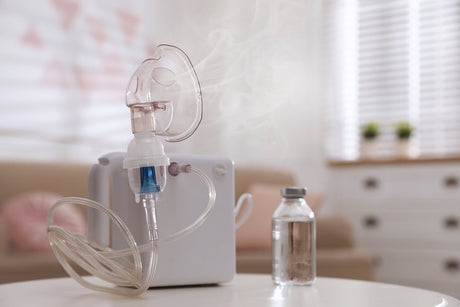CPAP stands for continuous positive airway pressure. It is a type of therapy that uses a machine to deliver pressurized air through a mask or nasal pillows to your airway. This helps keep your airway open and prevents it from collapsing during sleep, which is the main cause of obstructive sleep apnea (OSA).
OSA is a common sleep disorder that affects millions of people worldwide. It is characterized by repeated episodes of breathing pauses or shallow breathing during sleep, which can last from a few seconds to minutes. These episodes reduce the oxygen levels in your blood and disrupt your sleep quality, leading to daytime sleepiness, fatigue, headaches, mood swings, and increased risk of cardiovascular problems.
CPAP therapy is considered the gold standard treatment for OSA, as it can effectively reduce the frequency and severity of apnea events, improve your sleep quality and daytime functioning, lower your blood pressure and heart rate, and enhance your overall well-being.
However, CPAP therapy is not without challenges. Many people find it difficult to adjust to wearing a mask or nasal pillows every night, especially if they have allergies. Allergies are hypersensitive immune responses to certain substances or environmental factors, such as pollen, dust mites, mold, pet dander, or food. They can affect your respiratory system, skin, eyes, or digestive system, causing various symptoms that can interfere with your sleep and CPAP use.
In the next sections, we will discuss how CPAP and allergies are related, and what you can do to manage them effectively.
The Connection Between CPAP and Allergies
Allergies can affect your CPAP therapy in two ways: by making it harder to breathe through your nose, and by causing an allergic reaction to your CPAP equipment.
Nasal Congestion and CPAP
One of the most common symptoms of allergies is nasal congestion. This is when the lining of your nose becomes swollen and inflamed due to the presence of allergens. This reduces the space in your nasal passages and makes it harder for air to flow through them.
Nasal congestion can pose a problem for CPAP users who rely on their nose to breathe during sleep. If you have a stuffy nose, you may find it uncomfortable or impossible to use a nasal mask or nasal pillows. You may also experience mouth breathing, which can cause dry mouth, sore throat, bad breath, and reduced effectiveness of CPAP therapy.
To prevent nasal congestion from affecting your CPAP therapy, you should try to avoid or minimize exposure to allergens that trigger your symptoms. For example:
- Keep your bedroom clean and dust-free
- Use an air purifier or humidifier
- Wash your bedding regularly
- Avoid pets or animals that cause allergies
- Stay indoors when the pollen count is high
- Use hypoallergenic pillows and mattress covers
You should also consult your doctor about using medication or natural remedies to relieve your nasal congestion. Some options include:
- Antihistamines: These are drugs that block the action of histamine, a chemical that causes allergic reactions. They can help reduce nasal inflammation and mucus production.
- Decongestants: These are drugs that shrink the blood vessels in your nose and reduce swelling. They can help clear your nasal passages and improve airflow.
- Nasal sprays: These are liquids that you spray into your nose. They can contain saline (salt water), steroids (anti-inflammatory agents), or antihistamines. They can help moisturize, soothe, and unclog your nose.
- Nasal strips: These are adhesive strips that you stick on the bridge of your nose. They can help lift and open up your nostrils and increase airflow.
- Neti pots: These are devices that you fill with warm saline solution and use to rinse out your nasal cavities. They can help flush out allergens and mucus from your nose.
Allergic Reactions to CPAP Machine
Another way that allergies can affect your CPAP therapy is by causing an allergic reaction to your CPAP equipment. This is when your immune system reacts to a component of your CPAP mask, tubing, or humidifier, such as the material, the adhesive, the silicone, or the water. This can result in skin irritation or nasal inflammation, which can make it uncomfortable or painful to use your CPAP device.
Skin irritation can manifest as redness, itching, rash, blisters, or swelling on the areas of your face that come in contact with your CPAP mask. Nasal inflammation can manifest as sneezing, runny nose, nasal congestion, or sinus infection.
Shop our range of barrier creams here
To prevent allergic reactions to your CPAP equipment, you should follow these tips:
- Choose a CPAP mask that fits you well and does not cause pressure points or leaks
- Clean your CPAP mask and tubing regularly with mild soap and water
- Replace your CPAP mask and tubing every 3 to 6 months
- Use distilled water in your CPAP humidifier and change it daily
- Use hypoallergenic filters in your CPAP machine and change them monthly
- Use a heated hose to prevent condensation in your CPAP tubing
- Use a liner or a barrier between your skin and your CPAP mask, such as a cotton cloth, a silicone pad, or a gel cushion
If you suspect that you have an allergic reaction to your CPAP equipment, you should stop using it and contact your doctor or CPAP provider. They can help you identify the cause of your reaction and prescribe medication or alternative equipment to treat it.
How to Use Your CPAP Machine to Treat Allergies
While allergies can make it harder to use your CPAP machine, your CPAP machine can also help you treat your allergies. This is because CPAP therapy can improve your nasal function and reduce inflammation in your airway.
CPAP therapy can help you breathe better through your nose by increasing the pressure and humidity of the air that enters your nasal passages. This can help open up your nostrils and clear out any mucus or allergens that may be blocking them. It can also help moisturize and soothe your nasal lining and prevent it from drying out or cracking.
CPAP therapy can also help reduce inflammation in your airway by preventing apnea events and improving oxygen levels in your blood. This can help lower the production of inflammatory chemicals and cells that cause allergic reactions. It can also help strengthen your immune system and make it more resilient to allergens.
To use your CPAP machine to treat your allergies, you should follow these steps:
- Use a humidifier with your CPAP machine. A humidifier is a device that adds moisture to the air that flows through your CPAP device. This can help prevent dryness and irritation in your nose and throat. It can also help thin out any mucus or allergens that may be stuck in your nasal passages.
- Adjust the humidity level of your humidifier. The humidity level is the amount of moisture in the air that flows through your CPAP device. You can adjust it according to your preference and comfort. A higher humidity level can help relieve nasal congestion and inflammation, while a lower humidity level can help prevent condensation and leakage.
- Ask your practitioner to adjust the pressure level of your CPAP machine. The pressure level is the amount of force that the air exerts on your airway when it flows through your CPAP device. Your healthcare provider can adjust it according to your prescription and comfort. Never adjust the pressure without first consulting your sleep physician. A higher pressure level can help keep your airway open and prevent apnea events, while a lower pressure level can help reduce discomfort and noise.
- Use a ramp feature with your CPAP machine. A ramp feature is a function that gradually increases the pressure level of your CPAP device from a low setting to a high setting over a period of time. This can help you fall asleep more easily and comfortably while using your CPAP device.
- Use an auto-adjusting feature with your CPAP machine. An auto-adjusting feature is a function that automatically adjusts the pressure level of your CPAP device according to your breathing patterns and needs throughout the night. This can help you maintain optimal airflow and oxygen levels while using your CPAP machine.
FAQs
Q: Can a CPAP machine cause allergies?
A CPAP machine itself doesn't directly cause allergies. However, if the machine or its components are not properly cleaned and maintained, it can become a breeding ground for dust, mold, and allergens. Regular cleaning and proper hygiene practices can help prevent allergies related to your CPAP equipment.
Q: Can CPAP make allergies worse?
If you're already prone to allergies, CPAP therapy might exacerbate your symptoms if your equipment is not adequately cleaned or if your sleeping environment contains allergens. Nasal congestion, caused by allergies, can hinder the effectiveness of CPAP treatment. Proper cleaning routines and maintaining an allergen-free sleep space can help prevent this.
Q: Can I be allergic to my CPAP mask?
Yes, some individuals can experience allergic reactions to materials used in CPAP masks, particularly if they have sensitive skin. Common symptoms include redness, itching, and rash at the points where the mask makes contact with the skin. Opting for masks made from hypoallergenic materials and ensuring clean skin before wearing the mask can help minimize allergic reactions.
Q: What are the symptoms of a dirty CPAP machine?
A dirty CPAP machine can lead to various symptoms and issues, including:
- Skin Irritation: Dirty masks and cushions can cause skin irritation or redness on your face.
- Nasal Congestion: Accumulated dust and allergens can worsen nasal congestion, making it difficult to breathe properly.
- Increased Allergy Symptoms: Dirty equipment can introduce allergens into your airway, exacerbating allergy symptoms.
- Unpleasant Odors: Mold or bacterial growth in the humidifier or tubing can lead to unpleasant smells.
- Reduced Efficacy: Dust and debris can clog filters, affecting the airflow and reducing the effectiveness of the therapy.
Regular cleaning and maintenance of your CPAP equipment can help prevent these symptoms and ensure optimal therapy results.
Remember, if you have specific concerns or experience persistent symptoms, it's always a good idea to consult your healthcare provider or CPAP equipment supplier for guidance.
As a leading supplier of durable and home medical equipment (DME and HME), ApriaHome sources and distributes a wide range of treatment solutions, including assistive respiratory equipment and monitoring solutions.
We're here to support you as you work toward your improved health and well-being. We strive to meet your ever-evolving healthcare requirements with individualized attention and premium quality treatment solutions.
Looking to add CPAP supplies? Browse our premium solutions and let us help you get the most out of every day.
Looking for advice? Our helpful agents are on call at (800) 780-1508 between 8:00 am - 10:00 pm EST daily. Get in touch today.





